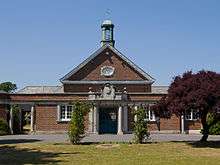Colyton Grammar School
 | |
| Mottoes | Expectation and Excellence (Originally Esse Qvam Videri) |
|---|---|
| Established | 1546 |
| Type | Grammar school, Academy |
| Religion | Church of England |
| Headmaster | Tim Harris[1] |
| Chairman of Governors | Dr Christopher J Bastin |
| Location |
Whitwell Lane Colyford Devon EX24 6HN England 50°43′41″N 3°04′21″W / 50.728°N 3.0725°WCoordinates: 50°43′41″N 3°04′21″W / 50.728°N 3.0725°W |
| DfE URN | 136366 Tables |
| Ofsted | Reports Pre-academy reports |
| Students | 826, including around 214 in the sixth Form |
| Gender | Mixed |
| Ages | 11–18 |
| Houses | 5 |
| Colours | Blue and gold |
| Publication | Seven Stripes |
| Website | www.colytongrammar.com |
Colyton Grammar School (commonly abbreviated to 'CGS') is a co-educational grammar school ( and Academy) located in the village of Colyford in East Devon, England that teaches students from years 7 to 13 (ages 11 to 18). The school has been classified by Ofsted as 'Outstanding' in three successive reports. The school has an open campus style setting situated on a site of over 18 acres (7.3 ha) in total.
In 2016-17 there are 826 students and just over 50 teaching staff and a similar number of support staff. Paul Evans became headteacher in 2008, succeeding Barry Sindall, who had held the position of headteacher for 18 years. Evans left that post at the end of the 2014-15 academic year and was replaced by Mrs J Wainwright. Mr T Harris joined the school as the new headteacher at the start of the 2016-17 academic year. In October 2015, a league table found Colyton 16th best place to live in England citing low crime rates and an excellent education system as influential factors in improving standards across the whole education system.[2]
History
The school was founded in 1546 by a group of twenty yeomen and merchants who bought some land from the crown "for the benefit of Colyton". Their first act was to endow a grammar school "for the goodly and virtuous education of children in Colyton for ever".
The school was situated in a single room over the porch of the parish church until the Feoffees hired a room in the town and the school was moved. In 1612, the school moved to the Church House, which had been enlarged by having another storey built on to it.
The first headmaster on record was William Hull, who joined the school in 1603, for a salary of £5 a year. The first headmistress – Mrs. Susanah Stokes – was appointed in 1792. It was only in 1875 that the school was established as a day and boarding school with its current name – Colyton Grammar School.
On 20 June 1876, the school population reached a record low of just one pupil. Numbers steadily increased again and by August 1884, there were 33 pupils. The school was closed in 1900 due to a lack of pupils and remained closed until 1905, when it was re-opened with a new headmaster.
In 1913, a change in the school's constitution allows girls to be admitted for the first time and the school officially becomes a co-educational grammar school. A Board of Governors with fifteen members was instituted in 1914. In 1929, the school moved to its present site in Colyford.
Recent developments
The school began a program of development and expansion in 1991, adding and renovating many buildings over the subsequent two decades. This included two new Study Centres, the "Study Centre" and the "Sindalls Building", a major renovation of the Chemistry block, the "Jowett Building", a new, expansive Science and Design & Technology block, the "Feoffees Building", a new Music building, a new Art building, the large "Walker Building" which contains the school library, called 'The Elizabeth Preston Library', History, Psychology and Modern Languages classrooms, a new Humanities building, the "Coly Building", including RE and Geography classrooms, a new canteen named "Take Five", and a complete refurbishment of the "Cottrill Hall", the main school hall.

On 1 January 2011, Devon County Council ceased to maintain the school. The school became one of the Coalition Government's Academies. Colyton Grammar School Academy Trust, an exempt charity and company limited by guarantee, assumed responsibility for this state-funded independent school. In late 2013, the Head of Science was convicted of making and distributing indecent images following a police investigation into his online activities.[3]
Curriculum
The school is a member of the South West Academic Trust, which brings together selective schools across the south west of England to share good practice. The school, as of 2007, had students taking GCSEs in Year 10 as opposed to Year 11, allowing for a three-year Sixth Form. As of September 2016, the GCSE exams are taken in Year 11 again, with the first examinations being taken in 2017-2018. There were no GCSE examinations taken in the academic year 2016-2017. The school offers the AQA Baccalaureate but has no current plans to offer the International Baccalaureate as an alternative to A levels.[4] There were falling grades as part of a national trend in 2013 but since then grades at GCSE have recovered. The Education Secretary at the time, Michael Gove, remarked: "This progress has been achieved at the same time as our EBacc has ensured many more young people are taking the core subjects which will most help them find a good job or go on to university."[5]
In the last four years, Colyton Grammar School has become one of the top schools in its grouping, and is consistently in the top four.[6]
Beginning in the academic year 2017-2018, 155 new students are admitted each year (as opposed to the former 124). This has prompted the creation of a new house, Elm, in addition to the existing Ash, Beech, Cedar and Oak. It appears that Elm has been placed between Cedar and Oak in the canonical ordering, resulting in Ash, Beech, Cedar, Elm and Oak. [7] This alphabetical ordering emphasises the lack of a house named after a tree beginning with the letter D, a position which Oak house may have originally been named to fill, set in the beautiful surroundings of rural Devon. David Cameron regularly takes family holidays in Budleigh Salterton. The Daily Mail speculated that their purpose was to be near an excellent grammar school in the area. In 2017 Colyton picked up national award for the student magazine Seven Stripes.[8]
Campaigners in Devon have argued that the most over-subscribed schools are not always the best; but academies are increasingly popular in the UK.[9] Colyton is part of the race to get students to the top universities. But there is an identifiable bias against local schools as perceived among Department of Education circles. One spokesman remarked: "Some of these state schools do outperform many independents but there is plenty of research showing that they also tend to have more affluent intakes than other local state schools." The challenge is to maximize a child's potential in the sector while accepting the advantages Grammar schools bring to Oxford.[10] However, for now growth in grammar schools in consonant with the Government's aims to grow excellence in education. As if to illustrate the fact the school took part in the Westminster Youth Parliament Finals during 2016.[11]
References
- ↑ Colyton Grammar School
- ↑ Place, Clarissa (2015-10-08). "Colyton claims place on family hotspot list". Midweek Herald. Retrieved 2017-12-17.
- ↑ "Colyton Grammar School teacher sentenced for child abuse images", BBC News South West, 3 December 2013
- ↑ Andrew Levy and Sarah Harris. "Endless re-sits devaluing GCSEs: Employers and parents hit out at schools that churn out 'exam robots' as tougher tests see biggest drop in top grades". Archived from the original on 2013-08-23. Retrieved 2017-12-17.
- ↑ Rt Hon Michael Gove MP (2014-01-23). "England's School League Tables: More Meet Government Targets". Retrieved 2017-12-17.
- ↑ "Colyton Grammar School's Headmaster's Blog Expectation and Excellence". Archived from the original on 2013-01-24. Retrieved 2017-12-17.
- ↑ "Colyton Grammar School: The Parents Handbook 2011-2012" (PDF). Retrieved 2017-12-17.
- ↑ "Colyton Grammar School wins National Award". Retrieved 2017-12-17.
- ↑ "Race for a Place". DevonLive. 2017-09-25. Retrieved 2017-12-17.
- ↑ "Elite state schools contribute to North-South admissions bias, study reveals". 2016-08-16. Retrieved 2017-12-17.
- ↑ "Pupils in Youth Parliament competition". ViewNews. 2016-10-13. Retrieved 2017-12-17.